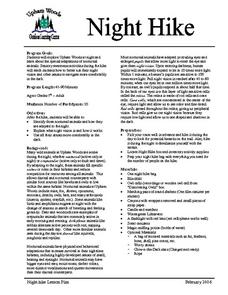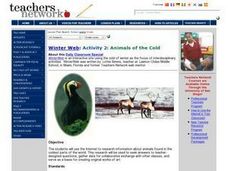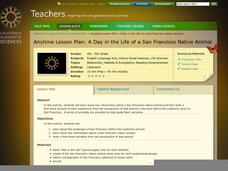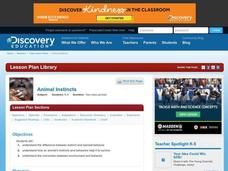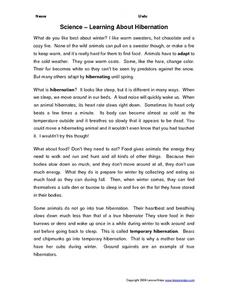Curated OER
Reading Research!
Young scholars observe the pictures in non-fiction books that focus on animals in the winter. In addition, they also listed to some read aloud books about hibernation, migration, adaptation and dormancy. Students draw pictures and write...
Curated OER
Hibernation and Estimation
In this hibernation worksheet, students first read the passage below about animals who hibernate to adapt to the cold weather. They then answer the 10 questions at the bottom of the page.
Curated OER
Snug in the Snow
Young scholars explore how snow helps animals survive in the wild. In this animal science lesson, students review key vocabulary words and discuss types of animal adaptations. Young scholars construct shoebox to simulate the snowy...
Curated OER
Night Hike
Students explore Upham Woods at night and investigate about the special adaptations of nocturnal animals. They identify three nocturnal animals and how they are adapted to the night. Students explain what night vision is and how it works.
Curated OER
Academic Raceway 500
This PowerPoint provides a raceway game in which students compete by answering animal questions correctly to advance their racecar. The main animal themes covered are adaptation, survival, endangered and extinct animals, and ways to...
Curated OER
Hibernation
Explain the process behind animal hibernation. This text-rich presentation provides clear information related to weather, animal behaviors, and their coping mechanisms.
Curated OER
Animals of the Cold
Students access the Internet to research information about animals found in the coldest parts of the world. They gather data for collaborative exchange and research answers to teacher designed questions. They create original works of art...
Curated OER
Biomes
Arranged as an interactive lesson, this presentation focuses on the six world biomes. Upcoming biologists click on a specific biome and a slide lists its location, description, native plants, and animals. A quiz provides learners with...
Curated OER
Habitat Basics
First graders get out and explore two different habitats to examine how each one meets the needs of the plants and animals that dwell there. They discuss what they've learned about animal habitats as they explore the outdoor environment....
Curated OER
Hawaii's Migratory Animals
Students act as travel agents to plan a trip for a migratory animal. They conduct research and design a travel brochure that includes a migratory route, illustrations of planned stopovers and special tourist attractions the animal might...
Curated OER
Keeping Warm
Students create a collage investigating different strategies animals use for keeping warm. This lesson is part of a multi-segmented unit on animal survival.
K5 Learning
Survival in the Wild
How do animals survive in the wild? Read about the different adaptations such as camouflage and self-protection that animals use to survive.
Curated OER
Keeping Warm When it is Cold: How does a polar bear keep warm?
Students make a model of a polar bear and discuss why fur/skin color is important. They also perform a simple experiment using black and white socks to determine how color affects temperature.
ARKive
Seasons in the Woods
Winter in the cold Northwoods of Wisconsin can be hard on animals that aren't adapted to the climate. Investigate the animals that are out and about even in the coldest winter temperatures as you and your class examine animal...
Curated OER
Praire Biome Models
Fifth graders, in groups, list the physical characteristics of a biome and think of ways in which animals might have to adapt to live there and make a biome mobile ball that show the different types of habitats that shape the praire biome.
K12 Reader
Fungi Are Alive
They are alive even though they are neither plants or animals! Yes, fungi are the subject of this two-part comprehension worksheet. Kids read the article and then use information found there to respond to comprehension questions.
American Museum of Natural History
Are YOU Cut Out for Antarctica?
Negative 80 degrees Fahrenheit, you say? Scholars complete a quiz to gauge their adaptability to the extreme climate of Antarctica. The quiz scored online gives them feedback of their likelihood of surviving in Antarctica.
California Academy of Science
A Day inthe Life of a San Francisco Native Animal
Although the lesson is specifically about the San Francisco Bay area, it's good enough to be adapted to any local region. Children research what the landscape in San Francisco was like prior to settlement, they consider the types of...
Curated OER
Animal Instincts
Students compare animal adaptations to human behavior. In this science lesson, students discuss animal instincts vs. learned behavior. Options for student writing, drawing and research are incorporated into this lesson plan
Curated OER
Snow Lovers or Haters
Students explain the three classifications that define how wildlife species react to winter; and name at least four examples each of chionophobes, chioneuphores, and chionophiles.
Curated OER
Science- Learning About Hibernation
In this hibernation worksheet, students answer 11 true or false questions and 5 fill in the blank questions regarding hibernation and the characteristics and habits of animals who hibernate.
Curated OER
Birds and Coffee
Fifth graders identify the changing seasons with how they affect animal and human behavior. They explain what migration is and why many birds migrate south for the winter. They then trace the coffee sold in their neighborhood and in...
Curated OER
How Animals Prepare for Winter
Second graders study which animal hibernate and which migrate. They observe the weather conditions related to each and complete the associated worksheets and web activity.
Prince William Network
The Incredible Journey
Divide your school gym into breeding grounds and non-breeding grounds so that your zoologists can play a game simulating the seasonal migration of shorebirds. Players pick one of the included game cards and follow its directions, which...





